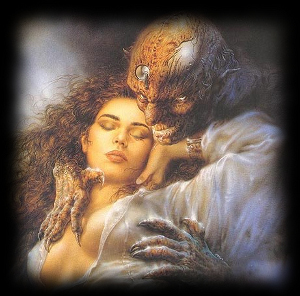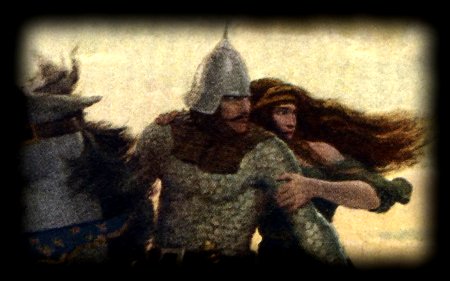The Influence of Christianity
During the early days of Christianity, the Church had been struggling for its own survival, and so it had been tolerant of its new converts holding on to their older, pagan traditions. Even today, many widely–recognized holidays are known to be Christianized versions of ancient pagan festivals. But as the Church grew in power, it was no longer willing to tolerate its members holding on to pagan customs, and it actively began persecuting any who did as "heretics" or "witches."
This posed a problem for Arthurian literature, much of which had been based on older, Celtic folklore. This was especially the case for the character of Merlin, who played a central role in Arthur's story, beginning with his conception. Merlin was good, yet used magic, and this had to be explained somehow.
In the twelfth century, a Frenchman named Robert de Boron wrote a poem retelling the wizard's story from a Christian perspective. In Robert's work, the Devil is greatly angered by the good work Jesus Christ has done to save humanity from the torments of Hell, and he seeks to send the Antichrist into this world to undo it. Merlin's mother is a pious woman who comes from a strong, religious family. His father is a demon who seeks to impregnate a mortal woman in order to bring about the Antichrist. The demon wreaks havoc on her family, and causes her parents to commit suicide. Then he enters her bedchamber and rapes her while she's sleeping. The next day, she goes to her family's confessor, a religious man named Blaise, who blesses the unborn child in her womb with the sign of the cross. Merlin is immediately baptized at birth. As a result, the evil is drawn out of his soul. But because of his demonic heritage, he retains his magical abilities.
 Robert's Merlin is portrayed as a good–natured wizard, although he does have a bit of a mischievous
streak as a result of his heritage. His magical ability is never clearly defined, although great emphasis
is placed on his ability to shapeshift. His demonic heritage gives him the ability to know events taking
place in both the past and the present. In addition, his connection to God gives him foresight into the
future, as well.
Robert's Merlin is portrayed as a good–natured wizard, although he does have a bit of a mischievous
streak as a result of his heritage. His magical ability is never clearly defined, although great emphasis
is placed on his ability to shapeshift. His demonic heritage gives him the ability to know events taking
place in both the past and the present. In addition, his connection to God gives him foresight into the
future, as well.
Other events taking place in Europe encouraged the Arthurian Legend to take on a religious aspect as well. The Crusades had caused a religious fervor in Europe, and this led some authors to reshape the traditional legends with religious undertones. Chrétien de Troyes had mentioned the Holy Grail in his poem Perceval, The Story of the Grail. But it was Robert de Boron who transformed the Grail into a sacred object associated with Christ. In Robert's tale, the Grail is the cup from which Jesus drank during the Last Supper. Joseph of Arimathea had his followers bring the sacred cup to Britain, and the cup can only be claimed by a descendant of his. In Robert's story, Perceval is a direct descendant of Joseph of Arimathea, and he is the knight who finally achieves the Grail in the end.
In addition to giving us the mischievous character of Merlin and the Grail, Robert de Boron also adds the Sword in the Stone to the Arthurian Legend, and expands on the Round Table, an element which had been added to The History of the Kings of Britain by a man named Wace when he translated it into French in 1155. It is under Robert that the Arthurian saga begins to resemble the legend as it has come to be known in modern times.
In the early thirteenth century, a collection of stories known as the Vulgate Cycle came into being. The author of this work is unknown, but historians believe it was most likely written by medieval monks. This tale retells Arthur's legend from a religious perspective, and includes Robert de Boron's stories of Merlin's conception, and of Joseph of Arimathea. However, the Grail Knight is changed to Galahad, who is only worthy of it because he has saved his virginity. In the Vulgate Cycle, a larger emphasis is placed on Lancelot's forbidden love for Queen Guinevere than had been in previous versions of the legend. Lancelot's love for Guinevere is made into a carnal sin, and he is denied the Grail because of it. Perceval, on the other hand, is a virgin, but is denied the Grail because he has felt sexual lust before. Only Galahad is able to obtain the cup because he is pure of any sexual desire. In the end, though, Britain is denied the Grail because it is deemed unworthy of it, and the Grail is lifted up into Heaven.
Modern–day historians believe the Grail Quest may have been a reflection of events that were taking place in the writers' time. After the First Crusade, Western Europe maintained control over Jerusalem for roughly one hundred years. But in 1187, the city was lost again to Muslim forces. The Church launched a Second Crusade to reclaim the city, but that was ultimately unsuccessful, and had to turn back. This loss of the Holy Land was a crushing blow to the Christian world, who had been the keepers of it for the past hundred years. Just a few decades later, the Grail story emerges. As literary historian Stephen Knight observes, both the Grail Quest and the Second Crusade have the element of gallant knights going on a great quest to retrieve a sacred object. They embark on a great adventure, and attain the object for some time, but it is ultimately lost in the end. The fact that Britain is ultimately denied the Grail because of God's judgment may have been intended to serve as a moral reminder to the people of Britain.

Other religious undertones manifested themselves in the Arthurian Legend as well. The medieval view of women was that they were either pure and virtuous like the Virgin Mary, or wicked temptresses like Eve, with no in–between. Guinevere was naturally painted as a wicked temptress because of her adulterous love for Lancelot, and some versions of the legend even had her willingly marry Mordred when he usurps Arthur's kingdom. The fall of Camelot as a result of the sinful love for a beautiful temptress has clear parallels with the expulsion of Man from the Garden of Eden in the book of Genesis. And, as in Christianity, the Arthurian Legend features a hero with a mystical birth who grows up to be a savior. In the end, he is killed because of a betrayal. But there is the suggestion that he will return.

